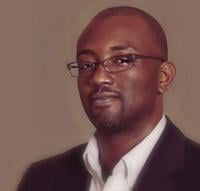Often, when issues on the African continent, in Ukraine, or the Gaza Strip enter the conversation, many Blacks respond with something to the effect of, “What does that have to do with my life right here?”
According to U.S. Rep. Ayanna Pressley and others, those global events have everything to do with our lives in the US.
One big reason is the nation’s stance on immigration, according to many social scientists, is directly impacted by U.S. foreign policy.
“America’s often negative, paternalistic and economically degrading foreign policy regarding Black and Brown nations colors how America mistreats, underfunds and disrespects Black and Brown people who are U.S. citizens or those who seek to be,” said African American Studies lecturer Thomas Allen.
“The system is hypocritical when it comes to some who come to this country versus others,” said award-winning journalist and author April Ryan while interviewing Pressley. “The ones who look like you and I don’t get here or have to be deported versus ones coming from other nations who look like the mainstream part of this nation.”
Here are some additional arguments regarding why Blacks need to pay attention to and care about foreign issues and foreign policy, particularly in the countries of Haiti, the Congo, and Sudan.
Haiti
Pressley doesn’t mince words regarding why Blacks in the U.S. should care about foreign policy, especially regarding Haiti.
“We owe the people of Haiti so much. They have been our models for the work of Black resistance, of independence and of liberation,” said Pressley, co-founder and co-chair of the House Haiti Caucus. “They have experienced so many injustices rooted in colonialism and unjust foreign policy. And the reason I want to start with the foreign policy is because the foreign policy is what informs the immigration policy.
She also argues a stronger Haiti helps America, especially on the issue of immigration.
“Right now, we see an influx of Haitian asylum seekers, which is their legal right. They are seeking safe haven in America because Haiti has been completely destabilized managing the layered crises of political destabilization in the wake of the assassination of their president, of economic devastation in the wake of hurricanes and earthquakes, and rampant violence, gang violence, because of guns that are being trafficked, weapons from the U.S. to Haiti that the gangs are using to reek violence and devastation… So, if people want to address the influx of Haitian migrant asylum seekers, we must stabilize Haiti.”
The Congo
Morehouse College faculty member Samuel Livingston displayed the flag of the Democratic Republic of Congo during President Joe Biden’s commencement address at the school to protest policies Livingston contends harm the country
In an Atlanta Journal Constitution article, Livingston wrote an op-ed arguing why U.S. citizens should care about U.S. actions in the Congo.
“All politics are local. The people of the Democratic Republic of Congo (DRC), although geographically distant, are culturally and historically close: About one in four African Americans who were enslaved were from that region. Their exploitation still drives our economy,” he wrote.
Siddharth Kara, a fellow at Harvard’s T.H. Chan School of Public Health and at the Kennedy School, has been researching modern-day slavery, human trafficking and child labor for two decades.
He contends, there is no modern American lifestyle without the overt suffering and abuse of the people and land of the Congo.
Kara says smartphones, computers and electric vehicles may be emblems of the modern world, but their rechargeable batteries are frequently powered by cobalt mined by workers laboring in slave-like conditions in the Democratic Republic of Congo.
“We shouldn’t be transitioning to the use of electric vehicles at the cost of the people and environment of one of the most downtrodden and impoverished corners of the world,” said Kara. “The bottom of the supply chain, where almost all the world’s cobalt is coming from, is a horror show.”
Sudan
The country called Sudan today was once home to the foremothers and forefathers of the ancient Egyptians—the Nubians. Without Nubia, there would be no Egyptian/Kemetic greatness that gave the world religion, art, science, and civilization.
Today, however, the violence in Sudan, instigated by decades of Western interference, has displaced more than three million people, including 2.2 million inside the country and more than 700,000 who have sought refuge in neighboring countries. More than 170,000 people have now crossed into South Sudan, which was already facing some of the highest levels of displacement and humanitarian need in the world.
“For all that this nation and this people have given the world, it is an ongoing crime against humanity if we do nothing to help,” said Allen. “The entirety of so-called modern civilization owes these people a debt of gratitude that can never be repaid. There is no civilization, no modern global power on earth that does not trace its opportunities for growth and wealth back to the Nubians and Sudan. Foreign policy regarding this nation should be our concern, at the very least.”
Aswad Walker is an associate pastor at the Shrine of the Black Madonna church in Houston. He is also a lecturer and adjunct professor in the African American studies department of the University of Houston, where he teaches “The Black Church in America” and “Black Liberation Theology.” He has authored five books and contributed to the Frederick Douglass Encyclopedia and the Journal of Black Studies.

Aswad Walker

